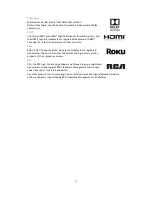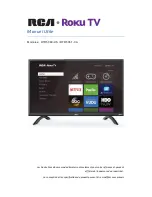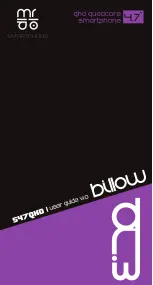
3
17)
Apparatus should not be exposed to dripping or splashing, and objects filled with liquids,
such as vases, should not be placed on the apparatus.
18)
When you install your TV, maintain a distance of at least 4 inches between the TV and other
objects (walls, cabinet sides, etc.) to ensure proper ventilation. Failing to maintain proper
ventilation may result in a fire or a problem with the product caused by an increase in its
internal temperature.
19)
Attention should be drawn to the environmental aspects of battery disposal. Don’t throw
used batteries in dustbin.
20)
An outside antenna system should not be located in the vicinity of overhead power lines or
other electric light or power circuits, or where it can fall into such power lines or circuits.
When installing an outside antenna system, extreme care should be taken to keep from
touching such power lines or circuits, as contact with them might be fatal.
21)
Do not overload wall outlets and extension cords, as this can result in a risk of fie or electric
shock.
22)
Do not push objects through any openings in this unit, as they may touch dangerous voltage
points or short out parts that could result in fie or electric shock. Never spill or spray any type
of liquid into the unit.
23)
If an outside antenna or cable system is connected to the unit, be sure the antenna or cable
system is grounded to provide some protection against voltage surges and built-up static
charges, Section 810 of the National Electrical Code, ANSI/NFPA 70, provides information
with respect to proper grounding of the mast and supporting structure, grounding of the
lead-in wire to an antenna discharge unit, size of grounding conductors, location of antenna
discharge unit, connection to grounding electrodes, and requirements for the grounding
electrode.
24)
When replacement parts are required, be sure the service technician uses replacement parts
specified y the manufacturer or those that have the same characteristics as the original part.
Unauthorized substitutions may result in fie, electric shock or other hazards.
25)
Upon completion of any service or repairs to this unit, ask the service technician to perform
safety checks to determine that the unit is in proper operating condition.
26)
When you connect the product to other equipment, turn off the power and unplug all of the
equipment from the wall outlet. Failure to do so may cause an electric shock and serious
personal injury. Read the owner's manual of the other equipment carefully and follow the
instructions when making any connections.
27)
Do not allow the product to output distorted sound for an extended period of time. It may
cause speaker overheating and fie.
28)
This reminder is provided to call the cable TV system installer’s attention to Article 820-40 of
the NEC that provides guidelines for proper grounding and, in particular, specifies that the
cable ground shall be connected to the grounding system of the building, as close to the
point of cable entry as practical.
29)
Sudden high volume sound may cause hearing or speaker damage. When you use
headphones, (if the unit is equipped with a headphone jack) keep the volume at a moderate
level. If you use headphones continuously with high volume sound, it may cause hearing
damage.
30)
The mains plug is used as the disconnect and shall remain readily operable.




































